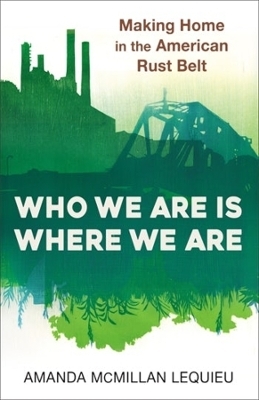
Who We Are Is Where We Are
Making Home in the American Rust Belt
Seiten
2024
Columbia University Press (Verlag)
978-0-231-19874-5 (ISBN)
Columbia University Press (Verlag)
978-0-231-19874-5 (ISBN)
Half a century ago, deindustrialization gutted blue-collar jobs in the American Midwest. But today, these places are not ghost towns. People still call these communities home, even as they struggle with unemployment, poverty, and other social and economic crises. Why do people remain in declining areas through difficult circumstances? What do their choices tell us about rootedness in a time of flux?
Through the cases of the former steel manufacturing hub of southeast Chicago and a shuttered mining community in Iron County, Wisconsin, Amanda McMillan Lequieu traces the power and shifting meanings of the notion of home for people who live in troubled places. Building from on-the-ground observations of community life, archival research, and interviews with long-term residents, she shows how inhabitants of deindustrialized communities balance material constraints with deeply felt identities. McMillan Lequieu maps how the concept of home has been constructed and the ways it has been reshaped as these communities have changed. She considers how long-term residents navigate the tensions around belonging and making ends meet long after the departure of their community’s founding industry.
Who We Are Is Where We Are links the past and the present, rural and urban, to shed new light on life in postindustrial communities. Beyond a story of Midwestern deindustrialization, this timely book provides broader insight into the capacious idea of home—how and where it is made, threatened, and renegotiated in a world fraught with change.
Through the cases of the former steel manufacturing hub of southeast Chicago and a shuttered mining community in Iron County, Wisconsin, Amanda McMillan Lequieu traces the power and shifting meanings of the notion of home for people who live in troubled places. Building from on-the-ground observations of community life, archival research, and interviews with long-term residents, she shows how inhabitants of deindustrialized communities balance material constraints with deeply felt identities. McMillan Lequieu maps how the concept of home has been constructed and the ways it has been reshaped as these communities have changed. She considers how long-term residents navigate the tensions around belonging and making ends meet long after the departure of their community’s founding industry.
Who We Are Is Where We Are links the past and the present, rural and urban, to shed new light on life in postindustrial communities. Beyond a story of Midwestern deindustrialization, this timely book provides broader insight into the capacious idea of home—how and where it is made, threatened, and renegotiated in a world fraught with change.
Amanda McMillan Lequieu is an assistant professor of sociology at Drexel University.
Preface and Acknowledgments
Introduction
1. Capitalism Makes Place: Constructing an Industrial Home
2. Home Without the Company: Deindustrializing the American Midwest
3. How to Stay in the Rust Belt: Work, Choice, and Home in the Decade After Company Closure
4. Stories of House, Landscape, Community: Narrating the Declining Action of Deindustrialization
5. Natural Resource Futures in Iron County
6. Tangled Landscapes in Southeast Chicago
Conclusion
Appendix A: Notes on Methods
Appendix B: Teach This Book
Notes
Index
| Erscheinungsdatum | 15.04.2024 |
|---|---|
| Zusatzinfo | 12 b&w illustrations |
| Verlagsort | New York |
| Sprache | englisch |
| Maße | 140 x 216 mm |
| Themenwelt | Sachbuch/Ratgeber ► Geschichte / Politik ► Regional- / Landesgeschichte |
| Geisteswissenschaften ► Geschichte ► Regional- / Ländergeschichte | |
| Geschichte ► Teilgebiete der Geschichte ► Wirtschaftsgeschichte | |
| Sozialwissenschaften ► Soziologie | |
| ISBN-10 | 0-231-19874-4 / 0231198744 |
| ISBN-13 | 978-0-231-19874-5 / 9780231198745 |
| Zustand | Neuware |
| Haben Sie eine Frage zum Produkt? |
Mehr entdecken
aus dem Bereich
aus dem Bereich


